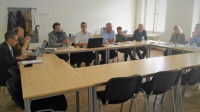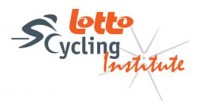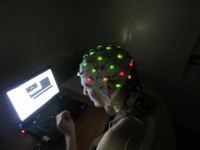The Strategic Research Program offers a platform for the collaboration between mechanical engineers of the Robotics and MultiBody Mechanics Research Group (R&MM), and human movement scientists of the Human Physiology and Sports Physiotherapy Research Group (MFYS) of VUB. R&MM houses experts in mechatronics and human-robot interaction. MFYS has expertise in evaluating the human response to robotic parts, fatigue mechanisms, neurogenesis and psycho-physiology.

The NanoBat mid-term meeting took place in Prague on 22/09/17 at the University of International and Public Relations Prague, where the project’s progress was succesfully evaluated by EU officers. As coordinating partner, the VUB was represented by Prof. Romain Meeusen and Drs. Jef Vanparijs.
The NanoBat project is an ambitious research project that focuses on the advancement of the concept of nanostructured delivery-L-menthol system for brown adipose tissue activation. In long term, the project aims to lead to a natural, safe, and replicable way to increase human metabolism, bringing the scientific community of EU/World one step closer to eradicating obesity and improving the lives of millions of people. For this goal, Artia cooperates with the University of Padova (Italy), VUB (Belgium), Imedica (Romania) and Inocure (Chech Republic) that also participate in the project.
For more information, please visit https://www.nanobat.org/
High levels of sedentary behaviour and low levels of physical activity are severe
threats for people’s mental and physical health and are associated with serious
direct and indirect costs for society. One possibility to counter this problem of
excessive sitting and too low physical activity levels is the implementation of
active workstations in different settings. Most active workstation research has
been directed to standing and walking desks. By assessing the possible role of
bike desks in fighting sedentary behaviour and the herewith associated health,
cognitive, school and work parameters in different settings and age-groups, this
dissertation addressed some of the gaps in the existing active workstation
literature.
It can be concluded that the implementation of bike desks can contribute to
reducing sedentary time in different settings and age-groups. Acute cycling at
low-intensity positively influences response speed across tasks requiring variable
amounts of attention and inhibition. Furthermore, positive effects on physical
health factors and parameters of general, school- and work-related well-being in
adolescents and adults were observed as a result of longer term exposure to the
bike desks. Using a bike desk in the classroom or in the office did not affect
school or work performance.

This project aims to evaluate the acute and longitudinal effects of polyphenol intake on exercise performance, recovery and the brain. It is known that both exercise and certain nutritional interventions can influence cognitive function and blood flow. In particular, polyphenols exert beneficial effects on cognitive function, but also on endothelial function. Moreover, they possess the ability to suppress oxidative and inflammatory stress. This project aims to evaluate the role of polyphenol intake in combination with exercise on physical and cognitive performance, cerebral blood flow and oxidative stress.

People who experience acute mental fatigue perform worse on cognitive tasks, they react slower and make more mistakes. Recently it has been reported that this form of fatigue also influences physical performance. The decrease in physical performance seems to be due to a higher perceived exertion in a mentally fatigued state, the reason for this higher perceived is exertion is however not known yet and that is what this research line tries to unravel. Some of the research questions are: ‘Are there any changes that occur in the brain during acute mental fatigue?’, ‘Has mental fatigue the same impact on physical performance in the heath?’, … the results observed in this research line could eventually lead to strategies to avoid the negative effect of mental fatigue on physical performance, in for example top athletes.


